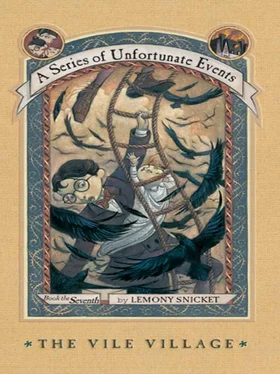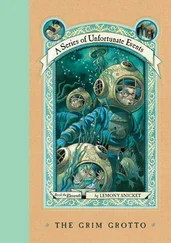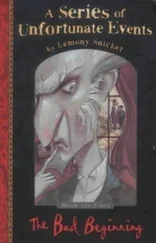Lemony Snicket - The Vile Village
Здесь есть возможность читать онлайн «Lemony Snicket - The Vile Village» весь текст электронной книги совершенно бесплатно (целиком полную версию без сокращений). В некоторых случаях можно слушать аудио, скачать через торрент в формате fb2 и присутствует краткое содержание. Год выпуска: 2001, Жанр: Прочие приключения, на английском языке. Описание произведения, (предисловие) а так же отзывы посетителей доступны на портале библиотеки ЛибКат.
- Название:The Vile Village
- Автор:
- Жанр:
- Год:2001
- ISBN:нет данных
- Рейтинг книги:3 / 5. Голосов: 1
-
Избранное:Добавить в избранное
- Отзывы:
-
Ваша оценка:
- 60
- 1
- 2
- 3
- 4
- 5
The Vile Village: краткое содержание, описание и аннотация
Предлагаем к чтению аннотацию, описание, краткое содержание или предисловие (зависит от того, что написал сам автор книги «The Vile Village»). Если вы не нашли необходимую информацию о книге — напишите в комментариях, мы постараемся отыскать её.
The Vile Village — читать онлайн бесплатно полную книгу (весь текст) целиком
Ниже представлен текст книги, разбитый по страницам. Система сохранения места последней прочитанной страницы, позволяет с удобством читать онлайн бесплатно книгу «The Vile Village», без необходимости каждый раз заново искать на чём Вы остановились. Поставьте закладку, и сможете в любой момент перейти на страницу, на которой закончили чтение.
Интервал:
Закладка:
"No," Klaus replied. "This isn't a rule book. This is a book about psychology, the study of the mind. It was removed from the library because there's a chapter about the Cherokee tribe of North America. They make all sorts of things out of feathers, which breaks Rule #39."
"That's ridiculous," Violet said.
"I agree," Klaus said, "but I'm glad this book was here, instead of in town, because it gave me an idea. There's a chapter here about mob psychology."
"Wazay?" Sunny asked.
1 "A mob is a crowd of people," Klaus explained, "usually an angry one."
"Like the townspeople and the Council of Elders yesterday," Violet said, "in Town Hall. They were incredibly angry."
"Exactly," Klaus said. "Now listen to this." The middle Baudelaire opened the second book and began to read out loud. "'The subliminal emotional tenor of a mob's unruliness lies in solitary opinions, expressed emphatically at various points in the stereo field.'"
"Tenor? Stereo?" Violet asked. "It sounds like you're talking about opera."
"The book uses a lot of complicated words," Klaus said, "but luckily there was a dictionary in Hector's library. It had been removed from V.F.D. because it defined the phrase 'mechanical device.' All that sentence means is that if a few people, scattered throughout the crowd, begin to shout their opinions, soon the whole mob will agree with them. It happened in the council meeting yesterday — a few people said angry things, and soon the whole room was angry-"
"Vue," Sunny said, which meant "Yes, I remember."
"When we get to the jail," Klaus said, "we'll make sure that Jacques is allowed to give his speech. Then, as he explains himself, we'll scatter ourselves throughout the crowd and shout things like, 'I believe him!' and 'Hear, hear!' Mob psychology should make everyone demand Jacques's freedom."
"Do you really think that will work?" Violet asked.
"Well, I'd prefer to test it first," Klaus said, "just like you'd prefer to test the self-sustaining hot air mobile home. But we don't have time. Now, Sunny, what did you discover from spending the night under a tree?"
Sunny held up one of her small hands to show them another scrap of paper. "Couplet!" she cried out triumphantly, and her siblings gathered around to read it.
The first thing you read contains the clue:
An initial way to speak to you.
"Good work, Sunny," Violet said. "This is definitely another poem by Isadora Quagmire."
"And it seems to lead us back to the first poem," Klaus said. "It says 'The first thing you read contains the clue.'"
"But what does 'An initial way to speak to you' mean?" Violet asked. "Initials, like V.F.D.?"
"Maybe," Klaus replied, "but the word 'initial' can also mean 'first.' I think Isadora means that this is the first way she can speak to us — through these poems."
"But we already know that," Violet said. "The Quagmires wouldn't have to tell us. Let's look at all the poems together. Maybe it will give us a complete picture."
Violet took the other two poems out of her pocket, and the three children looked at them together.
For sapphires we are held in here. Only you can end our fear.
Until dawn comes we cannot speak. No words can come from this sad beak.
The first thing you read contains the clue: An initial way to speak to you.
"The part about the beak is still the most confusing," Klaus said.
"Leucophrys!" Sunny said, which meant "I think I can explain that — the crows are delivering the couplets."
"How can that be possible?" Violet asked.
"Loidya!" Sunny answered. She meant something like "I'm absolutely sure that nobody approached the tree all night, and at dawn the note dropped down from the branches of the tree."
"I've heard of carrier pigeons," Klaus said "Those are birds that carry messages for a living But I've never heard of carrier crows."
"Maybe they don't know that they're carrier crows," Violet said. "The Quagmires could be attaching the scraps of paper to the crows in some way — putting them in their beaks, or in their feathers — and then the poems come loose when they sleep in Nevermore Tree. The triplets must be somewhere in town. But where?"
"Ko!" Sunny cried, pointing to the poems.
"Sunny's right," Klaus said excitedly. "It says 'Until dawn comes we cannot speak.' That means they're attaching the poems in the morning, when the crows roost uptown."
"Well, that's one more reason to get uptown," Violet replied. "We can save Jacques before he's burned at the stake, and search for the Quagmires. Without you, Sunny, we wouldn't know where to look for the Quagmires."
"Hasserin," Sunny said, which meant "And without you, Klaus, we wouldn't know how to save Jacques."
"And without you, Violet," Klaus said, "we'd have no chance of escaping from this town."
"And if we keep standing here," Violet said, "we won't save anybody. Let's go wake up Hector, and get moving. The Council of Elders said they'd burn Jacques at the stake right after breakfast."
"Yikes!" Sunny said, which meant "That doesn't give us much time," so the Baudelaires didn't take much time walking into the barn and through Hector's library, which was so massive that the two Baudelaire sisters could not believe Klaus had managed to find helpful information among the shelves and shelves of books. There were bookshelves so tall you had to stand on a ladder to reach their highest shelves, and ones so short that you had to crawl on the floor to read their titles. There were books that looked too heavy to move, and books that looked too light to stay in one place, and there were books that looked so dull that the sisters could not imagine anyone reading them — but these were the books that were still stacked in huge heaps spread out on the tables after Klaus's all-night reading session. Violet and Sunny wanted to pause for a moment and take it all in, but they knew that they didn't have much time.
Behind the last bookshelf of the library was Hector's inventing studio, where Klaus and Sunny got their first glimpse of the self-sustaining hot air mobile home, which was a marvelous contraption. Twelve enormous baskets, each about the size of a small room, were stacked up in the corner, connected by all sorts of different tubes, pipes, and wires, and circled around the baskets were a series of large metal tanks, wooden grates, glass jugs, paper bags, plastic containers, and rolls of twine, along with a number of large mechanical devices with buttons, switches, and gears, and a big pile of deflated balloons. The self-sustaining hot air mobile home was so immense and complicated that it reminded the two younger Baudelaires of what they thought of when they pictured Violet's inventive brain, and every piece of it looked so interesting that Klaus and Sunny could scarcely decide what to look at first. But the Baudelaires knew that they didn't have much time, so rather than explain the invention to her siblings, Violet walked quickly over to one of the baskets, which Klaus and Sunny were surprised to see contained a bed, which in turn contained a sleeping Hector.
"Good morning," the handyman said, when Violet gently shook him awake.
"It is a good morning," she replied. "We've discovered some marvelous things. We'll explain everything on our way uptown."
"Uptown?" Hector said, stepping out of the basket. "But the crows are roosting uptown. We do the downtown chores in the morning, remember?"
"We're not doing any chores this morning,"
Klaus said firmly. "That's one of the things we need to explain."
Hector yawned, stretched and rubbed his eyes, and then smiled at the three children "Well, fire away," he said, using a phrase which here means "begin telling me about your plans."
The siblings led Hector back through his inventing studio and secret library and waited while he locked up the barn. Then, as they took their first few steps across the flat landscape toward the uptown district, the Baudelaire orphans fired away. Violet told Hector about the improvements she had made on his invention, and Klaus told him about what he had learned in Hector's library, and Sunny told him — with some translation help from her siblings — about her discovery of how Isadora's poems were being delivered. By the time the Baudelaires were unrolling the last scrap of paper and showing Hector the third couplet, they had already reached the crow-covered outskirts of V.F.D.'s uptown district.
Читать дальшеИнтервал:
Закладка:
Похожие книги на «The Vile Village»
Представляем Вашему вниманию похожие книги на «The Vile Village» списком для выбора. Мы отобрали схожую по названию и смыслу литературу в надежде предоставить читателям больше вариантов отыскать новые, интересные, ещё непрочитанные произведения.
Обсуждение, отзывы о книге «The Vile Village» и просто собственные мнения читателей. Оставьте ваши комментарии, напишите, что Вы думаете о произведении, его смысле или главных героях. Укажите что конкретно понравилось, а что нет, и почему Вы так считаете.












